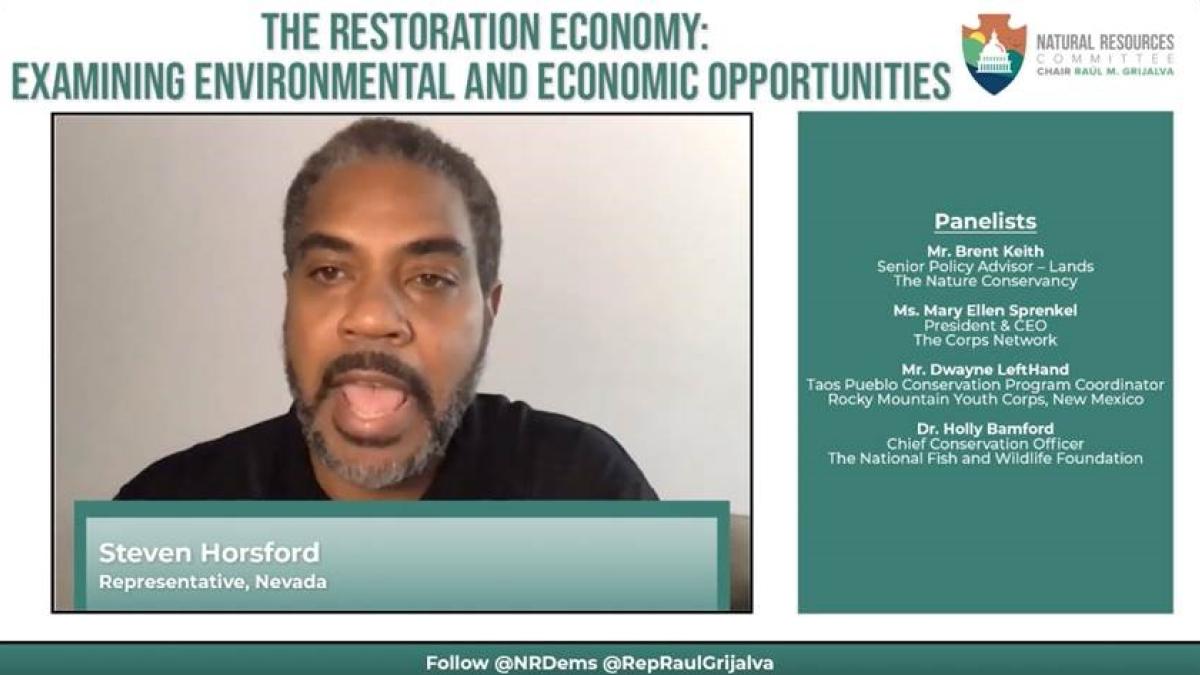Congressman Steven Horsford Examines Economic Restoration to Rebuild Nevada Economy

Washington, D.C. -- Today, Congressman Steven Horsford (NV-04) joined his colleagues in the Natural Resources Subcommittee on National Parks, Forests, and Public Lands for a virtual forum to discuss the restoration economy and examine environmental and economic opportunities. Restoration economy can be inclusive of efforts to conserve public lands and repair built infrastructure, but this forum will more specifically examine how we can invest in and grow the workforce needed to enhance natural ecosystem services and function.
"As a member of the House Natural Resources Committee, I'm urging my colleagues to meet this moment with robust federal investment in the restoration economy to rebuild our nation with much-needed jobs while fighting the climate crisis. Restoration economy has a proven history of producing economic development and meeting environmental objectives," said Congressman Steven Horsford. "With a record high unemployment at nearly 30 percent and a majority of the state consisting of public lands, Nevada is the perfect example of the need to create development that balances our natural splendor and the economy."
The panel featured guests from the Nature Conservancy, Corps Network, Rocky Mountain Youth Corps, New Mexico and the National Fish and Wildlife Foundation. This forum is especially timely as the House is expected to pass into law the Great American Outdoors Act (H.R. 7092) in the coming weeks. This bill offers a bipartisan opportunity to make a multi-generational investment in land and water conservation while dedicating funding to address the multi-billion-dollar deferred maintenance backlog in our national parks and on public lands.
Video of the Congressman's testimony can be watched and downloaded here.
The Congressman's prepared remarks and line of questioning are available below:
The Federal Government has long supported restoration efforts to create jobs and stimulate economic development. President Franklin Roosevelt established the Civilian Conservation Corps (CCC) in 1933 as part of the New Deal jobs programs following the Great Depression.
The CCC put young American men back to work on a variety of conservation and restoration projects, including the maintenance and repair of infrastructure, tree planting, stream restoration, erosion control, and trail building.
Now, more than ever, we need to invest in the restoration economy to stimulate economic growth amid the current pandemic.
In my home state of Nevada, we are seeing the highest unemployment rate in the country at nearly 30%. Therefore, it is necessary to do all we can to create jobs while protecting the environment.
Nevada would uniquely benefit from investments in the restoration economy as 87% of the state consists of public lands. My state is the perfect example of the need to create development that balances our natural splendor and the economy.
In fact, Nevada has received nearly $60 million in LWCF funding to expand and enhance recreational access across the state. Outdoor recreation is a critical part of Nevada's economy, generating more than $12 billion in annual consumer spending and three times as many jobs as the state's mining industry.
To that end, I'm glad that Congress will soon take up debate of the Great American Outdoors Act, which I am a cosponsor. This bill offers a bipartisan opportunity to make a multi-generational investment in land and water conservation while dedicating funding to address the multi-billion-dollar deferred maintenance backlog in our national parks and on public lands. The Great American Outdoors Act endorses the vision of our public lands as economic engines and job creators, but the potential to create jobs associated with the restoration economy is about much more than repairing outdated buildings, roads, and bridges.
There is continual pressure from stakeholders to direct Congressional spending towards green jobs that will support communities and protect the climate. I am happy we are having this forum today focusing on investing in the green economy.
Mr. Keith, can you explain a bit more about economic multiplier effects associated with restoration jobs?
Mr. Keith, how does restoration work help us respond and adapt to the climate crisis?
Ms. Sprenkel, has the Corps Network seen corps programs face coronavirus related challenges, and how can they be addressed?
Dr. Bamford, why is it important that Congress invest in conservation and restoration work?
